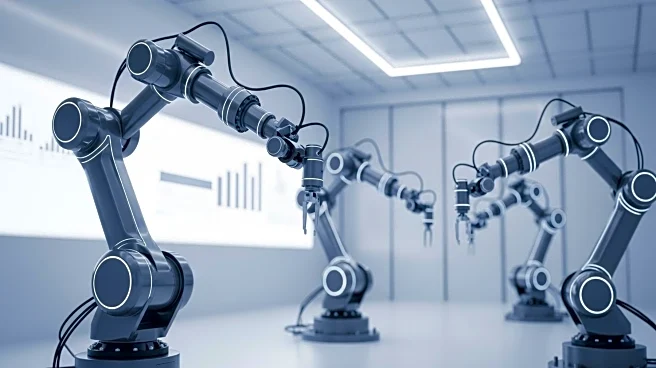What's Happening?
Mujin, a company specializing in intelligent robotics for logistics, manufacturing, and supply chain operations, has announced the launch of its integrator partner program. This initiative aims to make advanced automation more accessible to end users by equipping experienced integrators with MujinOS, a system that features a real-time digital twin. The digital twin continuously perceives, plans, and controls robotic systems, ensuring consistent performance even in environments with high variability. MujinOS utilizes 3D sensors to monitor the status of robotic work cells, with all data managed by the Mujin controller, eliminating the need for separate programming of the vision system.
Why It's Important?
The development of strategic integrator partnerships by Mujin is significant for the automation industry as it promises to streamline the integration of advanced robotics into various sectors. By simplifying the programming and control of robotic systems, MujinOS can potentially reduce costs and increase efficiency for businesses in logistics and manufacturing. This could lead to broader adoption of automation technologies, enhancing productivity and competitiveness in these industries. Companies that integrate Mujin's technology may benefit from improved operational capabilities and reduced reliance on manual processes.
What's Next?
As Mujin continues to expand its integrator partner program, it is likely that more companies will adopt its technology, leading to increased automation across different sectors. The success of this program could encourage other robotics companies to develop similar partnerships, further advancing the accessibility and implementation of automation technologies. Stakeholders in logistics and manufacturing may need to adapt to these changes by investing in training and infrastructure to support the integration of advanced robotics.
Beyond the Headlines
The introduction of Mujin's integrator partner program may have broader implications for workforce dynamics in industries reliant on manual labor. As automation becomes more prevalent, there could be shifts in employment patterns, necessitating new skills and training for workers. Additionally, the ethical considerations of increased automation, such as job displacement and the need for equitable access to technology, may become more prominent as these systems are adopted.









